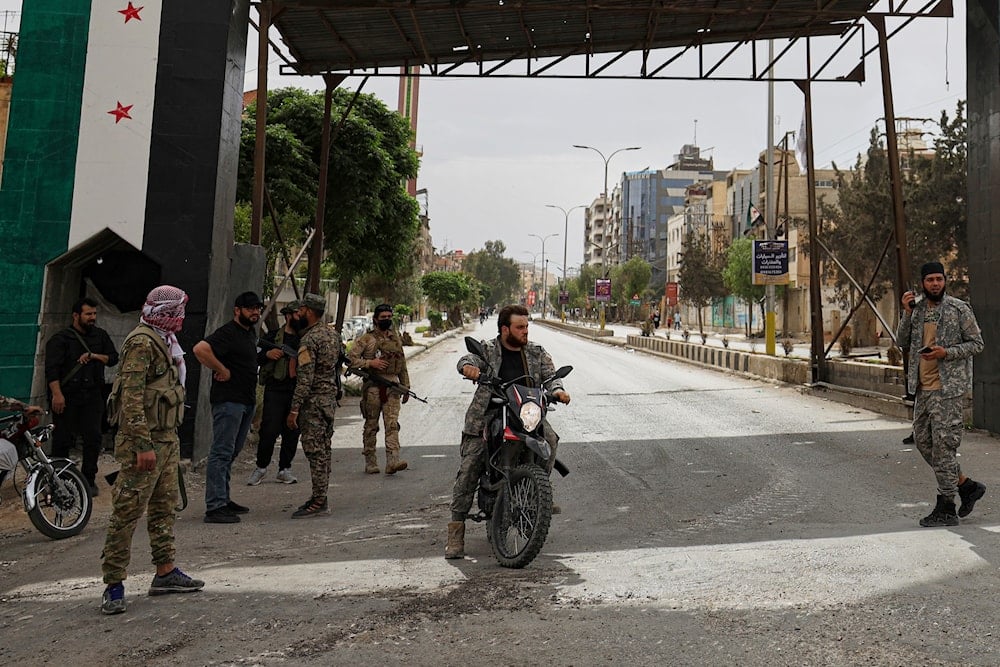Syrian gathering warns against rising sectarian violence in Syria
As sectarian violence in Syria escalates in Jaramana and Sahnaya, Syrian civil and political leaders denounce exclusion and extremism, urging inclusive nation-building to safeguard the country’s future.
-

Members of Syria's security forces deploy during clashes on the outskirts of the town of Sahnaya, south of Damascus, Wednesday, April 30, 2025. (AP)
In a statement, the expanded Syrian gathering of civil and political forces warned that the ongoing violence in Jaramana and Sahnaya primarily serves the goals of the Zionist project to fragment Syria and undermine its unity.
The assembly, which includes prominent figures from across the nation, denounced the escalating sectarian violence in Syria and called for urgent measures to preserve civil peace.
In their statement issued Thursday, the expanded Syrian meeting emphasized that current abuses are not isolated incidents but part of a broader campaign marked by criminal acts endangering Syrian lives.
“Blocking the treacherous opportunity from those seeking to exploit it is our duty,” the gathering declared, urging all Syrian patriots to reject any attempt to transform Syria into a land of extremism and death.
The assembly highlighted that silence over these developments is tantamount to complicity with a sectarian extremist agenda.
Syria must not become a graveyard
The meeting criticized the “de facto authority” for sidelining Syrians from meaningful participation in building national institutions, particularly within ministries tasked with preserving civil peace.
Instead, leadership roles have been assigned to groups with a narrow Salafi mindset and foreign actors, as per the statement.
“Syrians have never felt such fear for their lives and their very existence as they do now, especially after the massacres on the coast in March and the recent attacks in Jaramana and Sahnaya,” the statement read.
The statement delivered a clear call for unity and equal citizenship, affirming that Syria belongs to all its people and that lasting security and reconstruction hinge on inclusive national participation.
Call for equal citizenship and inclusive institutions
The gathering stressed that the transformation of Syria into a modern, civil, and decentralized state is possible only through the equal participation of all citizens. It condemned any role that perpetuates sectarian divisions, asserting that every Syrian has a right to justice and a share in the country’s future. “The ongoing exclusion of Syrians from key decision-making processes is a major catalyst for the ongoing sectarian violence in Syria,” the statement added.
In a separate but related address, Islamic scholar Sheikh Mohammad Rateb al-Nabulsi emphasized the sanctity of every Syrian life. “The blood of all the people of this nation is sacred, and retaliation should not come through chaos or revenge,” he stated.
Al-Nabulsi underscored that the logic of a state must be based on justice rather than vengeance or sectarian discord. “Sectarianism is merely a tool used to tear apart our unity. Syria belongs to everyone,” he affirmed, urging Syrians to resist divisive narratives and work together toward a just future.
France condemns sectarian violence against Druze in Syria
In a statement issued today, France denounced what it described as "deadly sectarian violence" against members of the Druze community in Syria, urging all Syrian and regional parties, including "Israel", to immediately cease hostilities.
The French Foreign Ministry’s statement emphasized the need for the Damascus authorities to make every possible effort to restore calm and stability. The statement also urged "Israel" to avoid any unilateral actions that could exacerbate sectarian tensions in the country.
Read more: ‘Israel’ admits role in Syria clashes under ‘protecting Druze’ pretext
Unfolding the story
Clashes continued to intensify across southern Syria this week, particularly in the Damascus countryside, despite the announcement of a preliminary ceasefire in select areas.
Fighting erupted overnight on Thursday on the Kanaker front, with local sources confirming to Al Mayadeen that heavy gunfire and mortar shelling struck the village.
By dawn, local factions reportedly repelled an armed assault by militant groups, successfully halting the offensive although intermittent gunfire persisted.
The latest confrontation follows several days of deadly unrest in southern Damascus. On Tuesday, violence broke out between government-backed armed groups and local residents in Jarmana and Ashrafiyet Sahnaya, resulting in over 70 fatalities. The dead included civilians, armed factions, and members of Syria’s General Security Force.
In detail, 30 members of the security forces and militants affiliated with the Ministry of Defense, in addition to 15 Druze militants and one civilian, were killed over two days, according to the Syrian Observatory for Human Rights.
In Sweida Governorate, 27 Druze militants were killed, 23 of whom were killed in an ambush on the Sweida-Damascus road on Wednesday.
How it all started
The conflict was initially triggered by the leak of an audio clip containing insults directed at the Prophet Muhammad. Although Druze religious leaders swiftly denounced the content, the unrest persisted.
As the security situation deteriorated, authorities announced a ceasefire agreement in Jarmana and Ashrafiyet Sahnaya late Wednesday. The announcement followed a high-level meeting involving governors from the Damascus countryside, al-Suwayda, and Quneitra, along with Druze sheikhs from Sahnaya.
Syrian Information Minister Hamza Mustafa accused "Israel" of taking advantage of the internal instability. “Israel is trying to play the sectarian card to gain a foothold in Syria as part of its ongoing plans,” he warned.
Mustafa reaffirmed that “Syrian Druze are an inseparable part of Syria and have contributed significantly at many pivotal moments in the country’s history.”
The situation remains tense, as local communities and authorities work to contain the violence and prevent further external interference in Syria’s internal affairs.

 5 Min Read
5 Min Read








